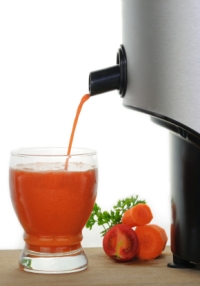A few months back, I watched the documentary ‘Fat, Sick and Nearly Dead‘ – which followed an overweight man as he completed a 60-day juice fast to gain back his health.
The film showed Joe Cross as he travelled around the U.S., subsisting purely on fruit and vegetable juice for all three meals a day. Admittedly, the day after I watched it, I set out to juice. I didn’t own a juicer so I opted to pile my fruits and veggies into a blender with water and puree until it was drinkable. I was expecting worse, but the taste was actually pretty good. And the fiber kept me full for a surprising amount of time.
But how long did my juice fast last? About two meals. I started craving ‘real foods,’ which meant my juicing experience was short-lived. But, for others, they see it as worth staying the course.
According to a recent article on MSN Health there’s been a recent surge in juice fasting as a means of get-thin-quick dieting – something we don’t view as a healthy approach to weight loss. This view was only further solidified after speaking with DietsInReview.com’s registered dietitian, Mary Hartley, RD.
“I’m on board with Dr. Madelyn Fernstom’s position that ‘cleaning out’ or ‘detoxing‘ your digestive system is completely unnecessary,” says Mary. “Fernstom says a healthy digestive system does not need a rest, and ‘that fiber is nature’s Roto-Rooter.'”
Mary also weighed in on whether or not juicing is a healthy practice for any length of time.
“A one-day fast is harmless, although there is no evidence that it benefits the body. And because calories are severely limited during a fast, you won’t get the nutrients you need, which may create an electrolyte imbalance if prolonged,” she says. “After a day or so of basically not eating, the body starts to break down protein from the muscles and organs to convert it to glucose to feed the central nervous system. Because muscle is metabolically active tissue, wastage leads to lower calorie requirements, which can promote weight gain in the long run. Food deprivation may also lead to overeating when food is available again.”
But one of the reasons many people turn to juicing is to ensure that they’re getting enough fruits and vegetables in their diet. Mary says we need 5-9 servings of fruit and vegetables a day depending on our overall calorie requirements. But that instead of fasting, we should begin eating a balanced diet of wholesome foods. She also issues a warning that pregnant and lactating women, growing children, insulin-dependent diabetics, and people taking certain medications should never fast.
In addition to these concerns, there’s no scientific evidence that juice fasting reduces the risk of cancer, boosts the immune system, aids digestion, or results in any kind of permanent weight loss, as some claim. And it should also be known that juice fasting can also cause:
- A persistent need to use the restroom
- Quick weight loss that comes back just as quickly
- Fatigue in the short-term
- Decline in muscle mass in the long-term
- Yo-yo dieting effect
So while this new ‘fad’ diet may be alive in well in among the weight and health conscious, we would recommend considering all of the pros and cons before pursuing a juice-only diet, as there are a number of risks tied to the practice. Based on research and evidence on this topic, I’ll be holding off on purchasing a juicer for myself as the supposed benefits just don’t seem worth it.
Also Read:
Nicole Richie’s Pre-Wedding Juice Fast
Beginner’s Guide to Juicing: Benefits of Fresh Juice
How to Safely Start a Juice Cleanse at Home
